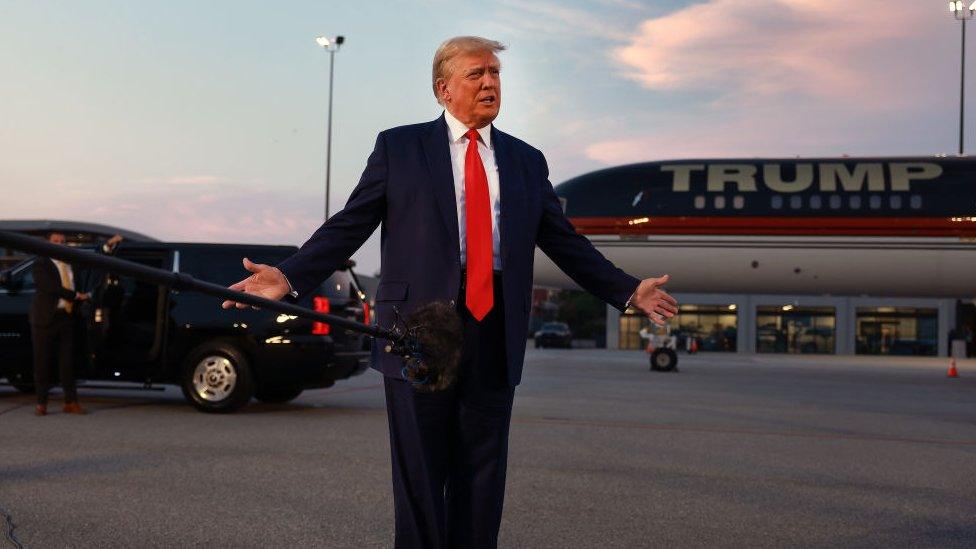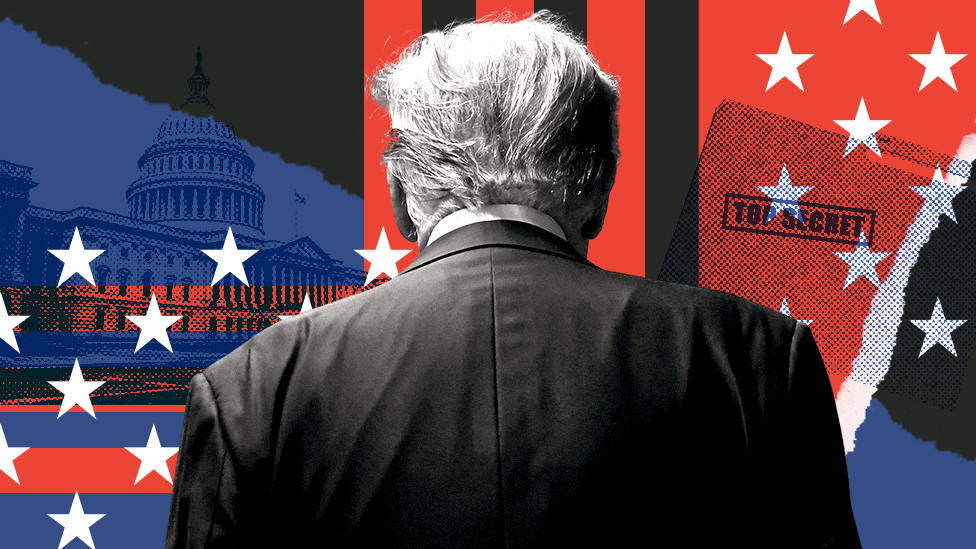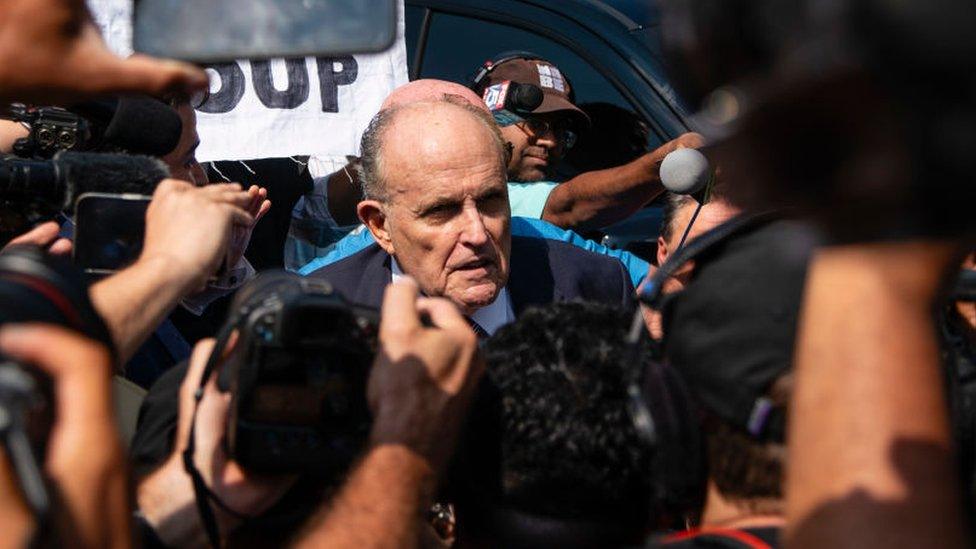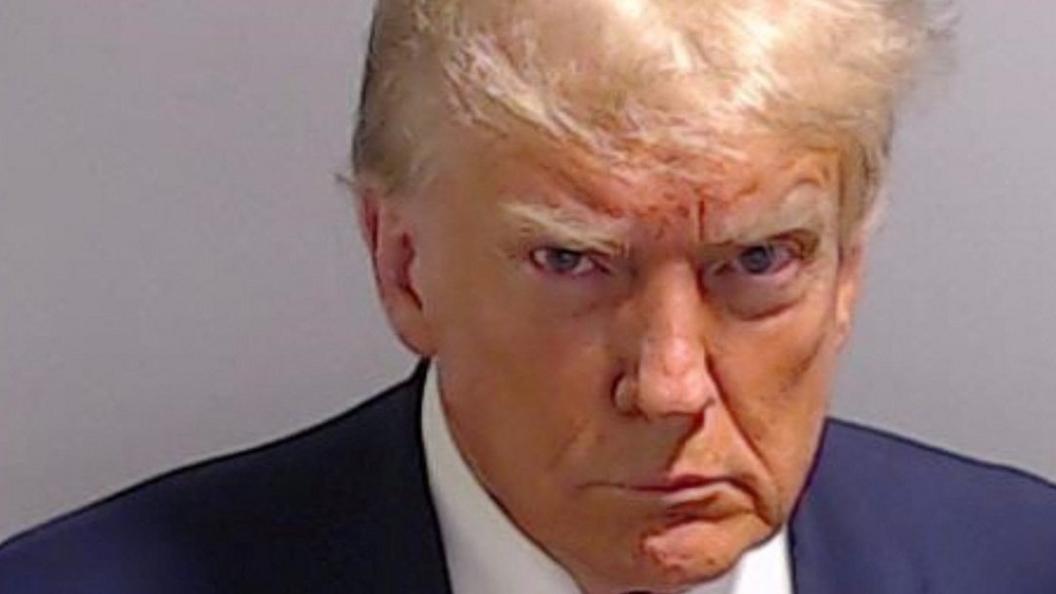Donald Trump's Georgia trial expected to take four months
- Published

Donald Trump surrendered in Georgia on 24 August and later pleaded not guilty and waived an in-person arraignment
Prosecutors in Donald Trump's Georgia racketeering case say that the trial would take four months and include approximately 150 witnesses.
Mr Trump and 18 others are charged with a conspiracy to overturn the state's 2020 presidential election results.
A date for the trial has not yet been set, although prosecutors hope to begin on 23 October.
The former president and his co-defendants have all denied any wrongdoing and pleaded not guilty.
In court on Wednesday, state prosecutor Nathan Wade said that the expected timeline does not account for jury selection, which could potentially add months to the process.
Fulton County Superior Court Judge Scott McAfee said he hopes to decide questions regarding the trial's schedule by "either the end of this week or early next week".
All 19 co-defendants in the case have pleaded not guilty and waived their right to in-person arraignments, which were due to take place on Wednesday.
During Wednesday's court session, Judge McAfee also heard arguments on whether some of the defendants could sever their cases from the wider racketeering, or Rico, case.
Attorneys for Kenneth Chesebro sought to sever the counts against him, as did attorneys for Sidney Powell, a former Trump lawyer, who has also asked for a speedy trial - a constitutional right in the US.
Both will now go on trial together on 23 October after Judge McAfee denied a motion to sever their cases from one another.
In court, he said that he does not believe that "the severance for Mr Cheseboro or Ms Powell is necessary to achieve a fair determination of the guilt or innocence for either defendant in this case".
He added that two separate trials would "inconvenience" jurors and complicate scheduling.
In total, six of the defendants in the case have sought to sever their cases, including Mr Trump and ex-Georgia Republican chair David Shafer.
Other defendants are seeking to have their cases moved to federal court. A federal judge has yet to decide on the issue, known by the legal term of "removal".
Mr Chesebro and Ms Powell's trial is slated to begin on 23 October - the same date being sought by district attorney Fani Willis for the other 17 defendants.
Judge McAfee, however, said it seemed "a bit unrealistic" to try all the defendants together in October, noting that "we've got less than two months to figure this out".
In court, Mr Chesebro's attorney Manubir Arora argued that the far-reaching racketeering case would mean that his client would have to be in court for "weeks, if not months" of testimony unrelated to the specific charges against him.
Additionally, Mr Arora said that Ms Powell - who famously vowed to "release the Kraken" after Mr Trump's electoral defeat - was "sort of on a lark on her own" and not connected to Mr Chesebro.
Speaking to CNN after the court hearing, Mr Chesebro's second attorney, Scott Grubman, accused the government of "weaponising" the Rico statute to "connect three or four conspiracies into one".
Prosecutors allege that Mr Trump and his co-defendants were involved in a multi-pronged effort to overturn the results of the 2020 presidential election in the state, culminating with a phone call in which Mr Trump pressured the state's secretary of state to "recalculate" the vote tally.
Related topics
- Published28 August 2024

- Published2 September 2023

- Published1 September 2023
